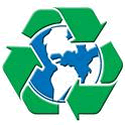
National Fire Plan Success Story
Green Actions by Incident Management Teams
Pacific Northwest and Alaska
National Fire Plan - Firefighting
2008

Sustainable operations take actions and create habits today to conserve resources for tomorrow. What sustainable operations do incident management teams undertake?
Teams recycle plastics, cans, aluminum, cardboard and paper in areas where recycling for them is available. Pacific Northwest (PNW) Team 2 issues each crew a plastic bag for their water bottles and then collects them each evening. Fred LaChance of the Blue Mountain Team reports that in an average week on an incident, they recycle cardboard that fills an 18-20 ft. box van, plastic bottles that fill 8 to 10 40-gallon garbage bags, aluminum to fill 2 to 3 40-gallon garbage bags, paper that fills 10 to 12 paper boxes, metal cans that fill 6 to 8 40-gallon garbage bags, and enough kitchen grease to fill seven 5-gallon buckets.
Hundreds of AA batteries are used on an incident. They are replaced daily in radios to make sure the radios stay functional. Collection buckets are set up for used batteries, which are recycled.
On a recent incident, the PNW Team 3 located a Bio Fuels Company that dropped off a bulk collection tank for kitchen grease at the fire camp. They retrieved it when full and left an empty, at no cost to the incident. An adjoining incident also sent their waste grease there.
The Blue Mountain and PNW 3 Teams set up donation boxes for local food banks for non-perishable food from lunches. Caterers often donate excess food at the end of an incident.
Often incident command base camps are in rural settings (e.g., hay field, parks) which require the use of generators for electrical power. Jeff Pendleton, Incident Commander of PNW Team 3, has found that a modest investment in a connection to the electrical power grid saves on the consumption of petroleum to produce electricity and provides a “cleaner” supply reducing down time of power sensitive equipment such as computer systems and radio equipment.
Recyclables often have to be transported from fire camps in remote settings. For example, the Oregon-California Team sent their recyclables from Happy Camp to a center in Yreka, a 1 ½-hour drive. Batteries were taken after the fire to a center in Medford, more than 2 hours away.
Rob Batten, Incident Commander of the Blue Mountain Team, notes that the level of recycling done by teams is improved when the host units have already collected information and contacts for local recycling facilities. Usually there is a delay in getting recycling started because of getting camp up and running. For further incentive in Oregon, aluminum cans, some glass, and plastic pop and water bottles purchased with an OR 5 ¢ stamp can be returned for the deposit.
For further information, contact Betty Mathews at 541-523-1203, bamathews@fs.fed.us.